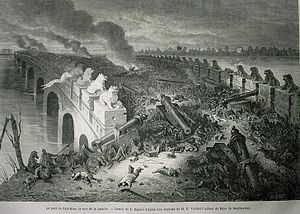Battle of Palikao
| ||||||||||||||||||||||||||||||
The Battle of Palikao (French: Le Combat de Palikao, Chinese: 八里橋之戰; pinyin: Bālǐqiáo zhī zhàn; literally: "Battle of the Eight-Mile Bridge") was fought at the bridge of Palikao by Anglo-French forces against China during the Second Opium War on the morning of 21 September 1860. It allowed Western forces to take the capital Beijing and eventually defeat the Qing Empire.[4]
Battle
The combined Anglo-French force which had recently occupied Tianjin engaged a Chinese army numbering thousands at Baliqiao. A fierce battle ensued, with the Anglo-French force inflicting massive losses on the Chinese army. Beijing was invaded thereafter.[5]
On the Chinese side, Sengge Rinchen's troops, including elite Mongolian cavalry, were completely annihilated after several doomed frontal charges against concentrated firepower from the allied forces.
The French troops were led by Charles Guillaume Cousin-Montauban, who was then awarded the title of Count of Palikao and a decade later, the 31st prime minister by Napoléon III. The British land forces were commanded by Sir James Hope Grant.[6]
Aftermath
With the Qing army devastated, Emperor Xianfeng fled the capital, leaving his brother, Prince Gong, to be in charge of negotiations.
The Anglo-French forces entered Beijing on 6 October. Anglo-French troops in Beijing began looting the Summer Palace and the Old Summer Palace. Harry Smith Parkes and the surviving diplomatic prisoners were freed, Lord Elgin ordered the Summer Palaces be burnt down, starting on 18 October. The destruction of the Forbidden City was even discussed, as proposed by Lord Elgin to discourage the Chinese from using kidnapping as a bargaining tool, and to exact revenge on the mistreatment of their prisoners.[7]
In the Treaty of Tientsin, the Qing court agreed to all Western demands, including the payment of indemnities and the acceptance of foreign diplomats at the imperial court in Beijing. Because neither Qing nor Western diplomats discussed the opium trade, the Treaty effectively liberalized it.
Notes
- ↑ de Saint-Amand & Martin 1912, p. 273
- ↑ 2.0 2.1 London Gazette: no. 22452, pp. 4770–4771, 27 November 1860. Accessed 28 September 2010.
- ↑ 3.0 3.1 de Saint-Amand & Martin 1912, p. 277
- ↑ Mourre 1968, p. 500
- ↑ Boulger 1893, p. 383
- ↑ Grant, Sir James Hope in Encyclopædia Britannica, 11th edition
- ↑ Endacott, G. B.; Carroll, John M (2005) [1962]. A biographical sketch-book of early Hong Kong. Hong Kong University Press. ISBN 978-962-209-742-1.
References
- Boulger, Demetrius Charles (1893). China. Kessinger Publishing. ISBN 1-4179-1627-3.
- de Saint-Amand, Imbert; Martin, Elizabeth Gilbert (1912). Napoleon III at the Height of His Power. Charles Scribner's Sons.
- Mourre, Michel (1968). Dictionnaire D'histoire Universelle. Éditions universitaires.
Further reading
- Luxembourg, Rosa The Accumulation of Capital Chapter 28: The introduction of the commodity economy
